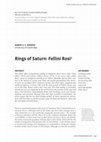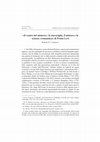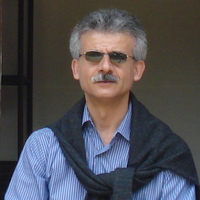Books by Robert S C Gordon
https://www.carocci.it/prodotto/primo-levi-magico
Primo Levi è stato un testimone lucido della... more https://www.carocci.it/prodotto/primo-levi-magico
Primo Levi è stato un testimone lucido della Shoah, un modello di pensiero etico e umano, ma anche un osservatore attento e ammirato, informato e incuriosito, di tutte le fenomenologie del mondo materiale, dell’immaginario e delle conoscenze che l’uomo ci costruisce sopra, dal cosmo all’atomo, dai meccanismi nascosti alle potenze trasformative dell’universo. La sua scienza e le sue conoscenze sono state, cioè, fonti di meraviglia. Anche in questo senso, Levi è stato testimone, portatore di un messaggio sulla “magia del reale”. Il volume propone una serie di indagini intorno a quest’altro Levi, al Levi “magico”.

https://www.uclpress.co.uk/collections/series-comparative-literature-and-culture/products/210089
... more https://www.uclpress.co.uk/collections/series-comparative-literature-and-culture/products/210089
Beliefs, superstitions and tales about luck are present across all human cultures, according to anthropologists. We are perennially fascinated by luck and by its association with happiness and danger, uncertainty and aspiration. Yet it remains an elusive, ungraspable idea, one that slips and slides over time: all cultures reimagine what luck is and how to tame it at different stages in their history, and the modernity of the ‘long twentieth century’ is no exception to the rule. Apparently overshadowed by more conceptually tight, scientific and characteristically modern notions such as chance, contingency, probability or randomness, luck nevertheless persists in all its messiness and vitality, used in our everyday language and the subject of studies by everyone from philosophers to psychologists, economists to self-help gurus.
Modern Luck sets out to explore the enigma of luck’s presence in modernity, examining the hybrid forms it has taken on in the modern imagination, and in particular in the field of modern stories. Indeed, it argues that modern luck is constituted through narrative, through modern luck stories. Analysing a rich and unusually eclectic range of narrative taken from literature, film, music, television and theatre – from Dostoevsky to Philip K. Dick, from Pinocchio to Cimino, from Curtiz to Kieślowski – it lays out first the usages and meanings of the language of luck, and then the key figures, patterns and motifs that govern the stories told about it, from the late nineteenth century to the present day.

Quest, 10 (2016), special issue, ed. by Robert S. C. Gordon and Emiliano Perra
(http://www.quest-... more Quest, 10 (2016), special issue, ed. by Robert S. C. Gordon and Emiliano Perra
(http://www.quest-cdecjournal.it/index.php?issue=10)
-Robert S. C. Gordon and Emiliano Perra, ‘Holocaust Intersections in 21st-Century Europe: An Introduction’
-Larissa Allwork, ‘Interrogating Europe’s Voids of Memory: Trauma Theory and Holocaust Remembrance between the National and the Transnational’
-Kara Critchell, ‘Remembering and Forgetting: the Holocaust in 21st Century Britain’
-Derek Duncan, ‘ “Il clandestino è l'ebreo di oggi”: Imprints of the Shoah on Migration to Italy’
-Luca Peretti, ‘ “La nostra fratellanza nel dolore”: the Jewish Community of Rome and the ‘Other’ Genocides’
-Stijn Vervaet, ‘Between Local and Global Politics of Memory: Transnational Dimensions of Holocaust Remembrance in Contemporary Serbian Prose Fiction and Film’
-Damiano Garofalo, ‘Temporal Cross-References and Multidirectional Comparisons: Holocaust Remembrance Day on Italian State Television’
Artices and chapters by Robert S C Gordon
in Curating Fascism: Exhibitions and Memory from the Fall of Mussolini to Today, ed. by Raffaele Bedarida and Sharon Hecker (New York: Bloomsbury), pp. 63-74, 2022
in ‘La questione'. Sciascia, Primo Levi, Manzoni: giustizia, tortura, intolleranza, ed. by Domenico Scarpa, special issue of Todomodo 12.2 : 95-108, 2022
Si sa che in Francia è frequente l'aggregazione di lettori particolarmente fedeli intorno al nome... more Si sa che in Francia è frequente l'aggregazione di lettori particolarmente fedeli intorno al nome di certi scrittori: associazioni che si dicono di amici: Amici di France, Amici di Giraudoux, Amici di Buzzati (e credo che Buzzati sia uno dei pochi scrittori stranieri a godere in Francia di una cerchia di amici); associazioni che, con quelle degli Amici del Libro, cui si debbono felicissimi incontri tra opere letterarie e artisti che le illustrano, sono segni di una civiltà intellettuale a noi quasi ignota.

Journal of Italian Cinema and Media Studies, special issue on ‘Gianfranco Rosi’, ed. by Rhiannon Daniels and John David Rhodes, 10. 3: pp. 449-74, 2022
This article offers a comparative reading of Gianfranco Rosi's Sacro GRA ('Holy GRA') (2013) and ... more This article offers a comparative reading of Gianfranco Rosi's Sacro GRA ('Holy GRA') (2013) and Federico Fellini's Roma (1972). It sets Sacro GRA within Rosi's career, his ambiguous identity as an 'Italian' filmmaker and the film's relation to the history of cinema in/on Rome and psycho-geographical road movies. It moves on to analyse Rosi's treatment of place and urban space, comparing key motifs and patterns in Sacro GRA with the short episode of Fellini's Roma, also set on the GRA, Rome's urban outer ring road. This dual reading is articulated around four axes of comparison in the construction and evocation of the ring-road space: street furniture, metacinematic frames and recordings, noises and silences, machines and monsters. Through these and other incidental constellations, the article argues that the two films display parallel, at times symmetrical, fascinations with the urban as simultaneously a space of utopia and dystopia, nature and the man-made, past and future.

in Matteo Cassani, Roberta Mira, Daniele Salerno, eds, The Heritage of a Transit Camp. Fossoli: History, Memory, Aesthetics (Oxford: Peter Lang, 2021), pp. 162-82
In , Feltrinelli published a remarkable book in its 'Universale economica' series, edited by Albe... more In , Feltrinelli published a remarkable book in its 'Universale economica' series, edited by Albe Steiner and Piero Cale , entitled Pensaci, uomo!. e book consisted largely of a photographic account of the Nazi genocide and the extermination camps, with brief, rhetorically powerful texts to accompany the images. e book was highly signi cant as a moment in the history of the dissemination of knowledge and awareness of the Holocaust in Italy, for its repertory and use of the photographic image as part of this history, and for its position in the development of the Fossoli/ Carpi museum project to which Steiner in particular was a key contributor. e chapter proposes to examine the history of this book in the light of these contexts and the questions that it raises.
in Lutz Klinkhammer and Clemens Zimmermann, eds, Cinema as Political Media. Germany and Italy Co... more in Lutz Klinkhammer and Clemens Zimmermann, eds, Cinema as Political Media. Germany and Italy Compared 1945-1950, Schriften des DHI Rom. Neue Series 5 (Rome/ Heidelberg: DHI/ Heidelberg University Press, 2021), pp. 131-49.
Open access at: https://heiup.uni-heidelberg.de/heiup/catalog/book/651?lang=en
Laboratoire italien, special issue on Écritures de la déportation, ed. by Enrico Mattioda, 24, 2020
Open Access at: http://journals.openedition.org.ezp.lib.cam.ac.uk/laboratoireitalien/4521
Robin Fiddian, ed., Jorge Luis Borges in Context (Cambridge: Cambridge University Press, 2020), 2020
in Michele Battini and Guri Schwarz, eds., San Rossore 1938. Contro gli ebrei (Atti del convegno, 20-21 September 2018) (Pisa: Pisa University Press, 2019), 2019
open access e-book. http://journals.openedition.org.ezp.lib.cam.ac.uk/laboratoireitalien/4521

Cucire parole, cucire molecole. Primo Levi e Il sistema periodico, ed. by Fabio Levi and Alberto Piazza (Turin: Accademia delle Scienze [Quaderni dell’Accademia n. 32], 2019), pp. 15-38, 2019
1. Nel 2008, il biografo e storico Richard Holmes, esperto del romanticismo inglese e uno dei cap... more 1. Nel 2008, il biografo e storico Richard Holmes, esperto del romanticismo inglese e uno dei capostipiti di una nuova e brillante scuola di biografi a anglosassone, che ha sfi dato le convenzioni della biografi a positivista adoperando una gamma di strumenti che va dalla narrativa empatica alla microstoria alla psicogeografi a 1 , ha pubblicato un libro abbastanza straordinario, una specie di biografi a collettiva di alcuni scienziati inglesi, raccogliendo e raccontando in parallelo le loro scoperte scientifi che e le loro avventure rocambolesche, tutte comprese nelle due generazioni antecedenti a Darwin, tra la fi ne del Settecento e l'inizio dell'Ottocento 2 . Holmes indaga sui rapporti tra questi scienziati e alcune delle fi gure letterarie più importanti e carismatiche dell'epoca, da Samuel Taylor Coleridge a William Wordsworth, da John Keats a Percy Shelley, su cui tra l'altro Holmes ha scritto pagine illuminanti 3 . Le fi gure principali ritratte da Holmes sono il botanico Joseph Banks (1743-1820), l'astronomo William Herschel (1738-1822), insieme a sua sorella e principale collaboratrice Caroline (1750-1848), e il chimico Humphrey Davy (1778-1829); e l'idea portante del libro risiede nell'osservazione attenta del fascino particolare per la scienza condivisa da tutti e quattro in quell'epoca post-illuminista, che, lungi dall'essere la provincia esclusiva della ragione pura o del rigore sistematico del metodo sperimentale baconiano (o meglio di una caricatura di esso) 4 , fu invece, come dimostrava la narrativa di Holmes, intriso
European Journal of Creative Practices in Cities and Landscapes (CPCL) 1 (2018), 2018
https://cpcl.unibo.it/article/view/8734/8742
ISLG Bulletin 17 (2018): 3-22, 2018

The article examines four mid-twentieth-century American works of literature that explore and tel... more The article examines four mid-twentieth-century American works of literature that explore and tell stories with notions of luck. It argues that luck in these works is deployed as a means to ‘stress-test’ the possibilities and the resilience of human agency, in the face of the contingencies and uncertainties of the modern. Widely varying in form and genre, and in different ways flawed, neglected or marginal in their author’s work or in literary history, each of the four sets a preternatural or reified force of luck at the heart of a destabilised or displaced vision of the world, and watches the tensions and contradictions that result. Several common motifs and concerns emerge, touching on fundamental issues at stake in twentieth-century (capitalist) modernity: questions of power and freedom, economies of property and fertility, the morality of family and fidelity, moral responsibility and the calculus of guilt, the singularity and multiplicity of the self and its interactions with temporality. The four texts are: Arthur Miller, The Man Who Had All the Luck (1944); Philip K. Dick, Solar Lottery (1954) and The Game-Players of Titan (1963); and Luke Rhinehart, The Dice Man (1971).
‘Introduction: Bare Witness’ in Primo Levi and Leonardo De Benedetti, Auschwitz Testimonies, 1945... more ‘Introduction: Bare Witness’ in Primo Levi and Leonardo De Benedetti, Auschwitz Testimonies, 1945-86, ed. Fabio Levi and Domenico Scarpa, trans. Judith Woolf (Cambridge: Polity, 2017), pp. 1-12
'Turns of Chance: Modern Luck and Italian Modernism (Marinetti, Montale, Pirandello)', in Guido B... more 'Turns of Chance: Modern Luck and Italian Modernism (Marinetti, Montale, Pirandello)', in Guido Bonsaver, Brian Richardson and Giuseppe Stellardi, eds, Cultural Reception, Translation and Transformation from Medieval to Modern Italy (Oxford: Legenda, 2017), pp. 257-71











Uploads
Books by Robert S C Gordon
Primo Levi è stato un testimone lucido della Shoah, un modello di pensiero etico e umano, ma anche un osservatore attento e ammirato, informato e incuriosito, di tutte le fenomenologie del mondo materiale, dell’immaginario e delle conoscenze che l’uomo ci costruisce sopra, dal cosmo all’atomo, dai meccanismi nascosti alle potenze trasformative dell’universo. La sua scienza e le sue conoscenze sono state, cioè, fonti di meraviglia. Anche in questo senso, Levi è stato testimone, portatore di un messaggio sulla “magia del reale”. Il volume propone una serie di indagini intorno a quest’altro Levi, al Levi “magico”.
Beliefs, superstitions and tales about luck are present across all human cultures, according to anthropologists. We are perennially fascinated by luck and by its association with happiness and danger, uncertainty and aspiration. Yet it remains an elusive, ungraspable idea, one that slips and slides over time: all cultures reimagine what luck is and how to tame it at different stages in their history, and the modernity of the ‘long twentieth century’ is no exception to the rule. Apparently overshadowed by more conceptually tight, scientific and characteristically modern notions such as chance, contingency, probability or randomness, luck nevertheless persists in all its messiness and vitality, used in our everyday language and the subject of studies by everyone from philosophers to psychologists, economists to self-help gurus.
Modern Luck sets out to explore the enigma of luck’s presence in modernity, examining the hybrid forms it has taken on in the modern imagination, and in particular in the field of modern stories. Indeed, it argues that modern luck is constituted through narrative, through modern luck stories. Analysing a rich and unusually eclectic range of narrative taken from literature, film, music, television and theatre – from Dostoevsky to Philip K. Dick, from Pinocchio to Cimino, from Curtiz to Kieślowski – it lays out first the usages and meanings of the language of luck, and then the key figures, patterns and motifs that govern the stories told about it, from the late nineteenth century to the present day.
(http://www.quest-cdecjournal.it/index.php?issue=10)
-Robert S. C. Gordon and Emiliano Perra, ‘Holocaust Intersections in 21st-Century Europe: An Introduction’
-Larissa Allwork, ‘Interrogating Europe’s Voids of Memory: Trauma Theory and Holocaust Remembrance between the National and the Transnational’
-Kara Critchell, ‘Remembering and Forgetting: the Holocaust in 21st Century Britain’
-Derek Duncan, ‘ “Il clandestino è l'ebreo di oggi”: Imprints of the Shoah on Migration to Italy’
-Luca Peretti, ‘ “La nostra fratellanza nel dolore”: the Jewish Community of Rome and the ‘Other’ Genocides’
-Stijn Vervaet, ‘Between Local and Global Politics of Memory: Transnational Dimensions of Holocaust Remembrance in Contemporary Serbian Prose Fiction and Film’
-Damiano Garofalo, ‘Temporal Cross-References and Multidirectional Comparisons: Holocaust Remembrance Day on Italian State Television’
Artices and chapters by Robert S C Gordon
Open access at: https://heiup.uni-heidelberg.de/heiup/catalog/book/651?lang=en
Primo Levi è stato un testimone lucido della Shoah, un modello di pensiero etico e umano, ma anche un osservatore attento e ammirato, informato e incuriosito, di tutte le fenomenologie del mondo materiale, dell’immaginario e delle conoscenze che l’uomo ci costruisce sopra, dal cosmo all’atomo, dai meccanismi nascosti alle potenze trasformative dell’universo. La sua scienza e le sue conoscenze sono state, cioè, fonti di meraviglia. Anche in questo senso, Levi è stato testimone, portatore di un messaggio sulla “magia del reale”. Il volume propone una serie di indagini intorno a quest’altro Levi, al Levi “magico”.
Beliefs, superstitions and tales about luck are present across all human cultures, according to anthropologists. We are perennially fascinated by luck and by its association with happiness and danger, uncertainty and aspiration. Yet it remains an elusive, ungraspable idea, one that slips and slides over time: all cultures reimagine what luck is and how to tame it at different stages in their history, and the modernity of the ‘long twentieth century’ is no exception to the rule. Apparently overshadowed by more conceptually tight, scientific and characteristically modern notions such as chance, contingency, probability or randomness, luck nevertheless persists in all its messiness and vitality, used in our everyday language and the subject of studies by everyone from philosophers to psychologists, economists to self-help gurus.
Modern Luck sets out to explore the enigma of luck’s presence in modernity, examining the hybrid forms it has taken on in the modern imagination, and in particular in the field of modern stories. Indeed, it argues that modern luck is constituted through narrative, through modern luck stories. Analysing a rich and unusually eclectic range of narrative taken from literature, film, music, television and theatre – from Dostoevsky to Philip K. Dick, from Pinocchio to Cimino, from Curtiz to Kieślowski – it lays out first the usages and meanings of the language of luck, and then the key figures, patterns and motifs that govern the stories told about it, from the late nineteenth century to the present day.
(http://www.quest-cdecjournal.it/index.php?issue=10)
-Robert S. C. Gordon and Emiliano Perra, ‘Holocaust Intersections in 21st-Century Europe: An Introduction’
-Larissa Allwork, ‘Interrogating Europe’s Voids of Memory: Trauma Theory and Holocaust Remembrance between the National and the Transnational’
-Kara Critchell, ‘Remembering and Forgetting: the Holocaust in 21st Century Britain’
-Derek Duncan, ‘ “Il clandestino è l'ebreo di oggi”: Imprints of the Shoah on Migration to Italy’
-Luca Peretti, ‘ “La nostra fratellanza nel dolore”: the Jewish Community of Rome and the ‘Other’ Genocides’
-Stijn Vervaet, ‘Between Local and Global Politics of Memory: Transnational Dimensions of Holocaust Remembrance in Contemporary Serbian Prose Fiction and Film’
-Damiano Garofalo, ‘Temporal Cross-References and Multidirectional Comparisons: Holocaust Remembrance Day on Italian State Television’
Open access at: https://heiup.uni-heidelberg.de/heiup/catalog/book/651?lang=en
OF PRIMO LEVI, Public Books (15 January 2016). [Review article]
http://www.publicbooks.org/multigenre/hard-labor-on-the-complete-works-of-primo-levi
https://www.cambridge.org/core/journals/modern-italy/article/past-present-and-future-of-the-italian-memory-of-fascism-interviews-with-luisa-passerini-filippo-focardi-john-foot-robert-gordon-and-philip-cooke/4036021098851038C3971535B0516ED9